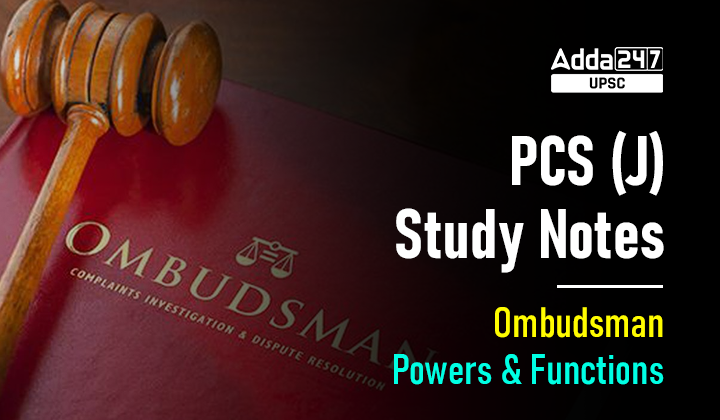Table of Contents
Powers and Functions of Ombudsman
An Ombudsman is a government employee whose job it is to look into allegations of wrongdoing by public officials. The technical definition of an Ombudsman is an official who handles complaints. A public Ombudsman is someone who looks into complaints of wrongdoing by an administrative body. What this means is that citizens have the right to file complaints against the relevant authority if they observe serious flaws in the operation of the public sector. He serves as a parliamentary officer.
Now more than ever, an office of an Ombudsman or someone with similar authority is an integral part of any functional government. A shift from an unrestricted free market to government oversight has occurred in the majority of nations in the 21st century. Resulting from the new economic policy, the state is now acting as a facilitator, enabler, and regulator. As a result, there are many more opportunities for confusion between a public servant and a citizen. The importance of an individual’s right to protection from administrative wrongdoing has diminished as a result of progress and development. As a result, it has become increasingly important to have institutions like the Ombudsman to safeguard the interests of the “little man” from abuses by the administrative state.
Powers and functions:
- Aiming to safeguard people’s fundamental liberties.
- Order any official or employee of the Government or of any subdivision, agency, or instrumentality thereof, or of any government-owned or controlled corporation with an original charter, to do and accelerate the performance of any act or duty required by law, or to stop, prevent, and correct any abuse or impropriety in the performance of such responsibilities.
- Having the authority to oversee the government at large. In this respect, ombudsman work is intrinsically linked to government service.
- Tell the relevant person to discipline a public servant who has broken the law by failing to do something required of them or by doing something wrong when they should have.
- The authority to probe allegations of corruption (of any kind) against all high court judges as well as government officials at all levels.
- Authority to make independent decisions. The scope of discretionary authority is extremely large, and its exercise is left to the individual.
लोकपाल की शक्तियां और कार्य
लोकपाल एक सरकारी कर्मचारी होता है जिसका काम सरकारी अधिकारियों द्वारा गलत काम करने के आरोपों को देखना होता है। लोकपाल की तकनीकी परिभाषा एक अधिकारी है जो शिकायतों को संभालता है। एक सार्वजनिक लोकपाल वह होता है जो एक प्रशासनिक निकाय द्वारा गलत काम करने की शिकायतों को देखता है। इसका मतलब यह है कि नागरिकों को संबंधित प्राधिकरण के खिलाफ शिकायत दर्ज करने का अधिकार है यदि वे सार्वजनिक क्षेत्र के संचालन में गंभीर खामियां देखते हैं। वह एक संसदीय अधिकारी के रूप में कार्य करता है।
अब पहले से कहीं अधिक, किसी लोकपाल या समान अधिकार वाले किसी व्यक्ति का कार्यालय किसी भी कार्यात्मक सरकार का एक अभिन्न अंग है। 21वीं सदी में अधिकांश देशों में एक अप्रतिबंधित मुक्त बाजार से सरकारी निरीक्षण में बदलाव हुआ है। नई आर्थिक नीति के परिणामस्वरूप, राज्य अब एक सुगमकर्ता, प्रवर्तक और नियामक के रूप में कार्य कर रहा है। नतीजतन, एक लोक सेवक और एक नागरिक के बीच भ्रम के कई और अवसर हैं। प्रगति और विकास के परिणामस्वरूप किसी व्यक्ति के प्रशासनिक गलत कामों से सुरक्षा के अधिकार का महत्व कम हो गया है। नतीजतन, प्रशासनिक राज्य द्वारा दुर्व्यवहार से “छोटे आदमी” के हितों की रक्षा के लिए लोकपाल जैसी संस्थाओं का होना तेजी से महत्वपूर्ण हो गया है।
शक्तियां और कार्य:
- लोगों की मौलिक स्वतंत्रता की रक्षा करना।
- सरकार के किसी भी अधिकारी या कर्मचारी को या किसी उपखंड, एजेंसी, या उसके उपकरण, या किसी सरकारी स्वामित्व वाले या नियंत्रित निगम के मूल चार्टर के साथ, कानून द्वारा आवश्यक किसी भी कार्य या कर्तव्य के प्रदर्शन में तेजी लाने के लिए आदेश दें, या ऐसी जिम्मेदारियों के प्रदर्शन में किसी भी दुरुपयोग या अनौचित्य को रोकने, रोकने और ठीक करने के लिए।
- बड़े पैमाने पर सरकार की देखरेख करने का अधिकार होना। इस संबंध में, लोकपाल का कार्य आंतरिक रूप से सरकारी सेवा से जुड़ा हुआ है।
- संबंधित व्यक्ति को किसी ऐसे लोक सेवक को अनुशासित करने के लिए कहें, जिसने अपने लिए आवश्यक कुछ करने में विफल रहने या कुछ गलत करने पर कानून तोड़ा है।
- उच्च न्यायालय के सभी न्यायाधीशों के साथ-साथ सभी स्तरों पर सरकारी अधिकारियों के खिलाफ भ्रष्टाचार (किसी भी प्रकार के) के आरोपों की जांच करने का अधिकार।
- स्वतंत्र निर्णय लेने का अधिकार। विवेकाधीन प्राधिकार का दायरा बहुत बड़ा है, और इसका प्रयोग व्यक्ति पर छोड़ दिया जाता है।



 TSPSC Group 1 Question Paper 2024, Downl...
TSPSC Group 1 Question Paper 2024, Downl...
 TSPSC Group 1 Answer key 2024 Out, Downl...
TSPSC Group 1 Answer key 2024 Out, Downl...
 UPSC Prelims 2024 Question Paper, Downlo...
UPSC Prelims 2024 Question Paper, Downlo...






